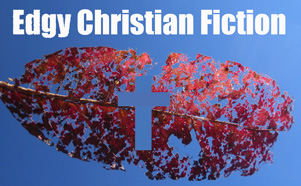If reading today’s Christian fiction seems analogous to eating stale army rations, you will enjoy this article.

by
Creatives.
We abound in the fantastic. We thrive in the extraordinary. We skirt convention, we thwart the mundane, we flesh out the status quo.
As creatives, we create. And much of what we create can be…messy. Or rather, it should be.
How can painters paint without getting paint all over the place? How can writers write without eventually surrounding themselves in a mountain of scrapped and balled-up paper? What about those who do clay? Woodworking? Metal?
Of course, I’m not really here to talk about a physical mess. You won’t be able to avoid making a mess at some point if you work in the creative arts. I mean a mess, internal, displayed as external.
Isn’t the point of art to pour ourselves out, as a sacrifice to our work? Painters bleed upon the canvas, revealing the hurt, the pain, the virulent emotions they feel on a daily basis. Writers slit their wrists and bleed words on the page, exposing – for all to see/read – their turbulent lives and their unique and sometimes jaded viewpoint of the world. Those who work in crafts put pieces of themselves into their artwork, assembling fragments of their childhood trauma, slivers of their complex personalities, shards of their hopes and ambitions – failed and otherwise.
Every element of the creative arts requires a sacrifice from us, it requires truth – however hard and painful that truth may be. Our truths are what make our art. Who we are is our art.
So then, why does so much Christian fiction fall flat in the area of ‘creative’? Don’t get me wrong, there are tons of Christ-centered creatives out there in the world. They are building, they are drawing, they are designing. They are even writing.
But what are they writing?
A lot of the Christian fiction I have read over the years seems to lack a certain something. I mean, sure, the stories are filled with creative characters, creative plots, creative worlds. But what I don’t see a lot of is honesty. Truth. Mess.
Ironic, isn’t it? You would think, seeing as Christians tout about truth so much, that Christian fiction wouldn’t be exempt from honesty and messiness and truth.
But much of it is.
It’s because there’s been a line that was drawn in the sand a very long time ago. And that line was drawn to keep us at bay with our true feelings, our true thoughts, our true experiences. We can display these things in our Christian fiction, if – and only if – they do not offend others, they do not destroy the utopian dream of what Christianity should look like, they do not shake the very shaky structure of Christian publishing.
In other words, we must limit ourselves. Many argue that we limit ourselves in Christian fiction because we are called to limit ourselves in our personal lives. We mustn’t sin. And the same is true for our fiction. But is writing about sin the same as sinning? Not hardly.
Christian fiction has fallen flat in many areas because, to put it bluntly, some of it is just boring. And it’s boring because it lacks truth. It lacks the mess that makes us who we are. My wife doesn’t love me because I’m perfect. She doesn’t love me in spite of my imperfections, but because of them. They are a piece of me, a part of who I am, and so to deny my imperfections is to deny a piece of me. And I wouldn’t want my wife to only love a part of me, I want her to love all of me.
Christian fiction has seriously lacked the mess that could make it potentially awesome. Characters are too perfect, too ‘Christian’. They don’t swear, they don’t fight, they don’t question, they don’t drink, they don’t kill, they don’t fear. They are cut out of an Orwellian future and glued into our stories, and for what? To appease the masses? What masses?
As creatives, we are denying ourselves the most important part of the creative process – the mess – by adhering to cookie-cutter plots, hamfisted redemptive themes, and cardboard characters.
Fiction is a story, it is a tale. Most times, it is a tale about us, about those around us. We lie to ourselves and all of our readers if we hide the truth from our manuscripts.
I promise you: Write the mess, and nothing horrible will happen to you. Yes, you might stir the waters a bit, but that’s what all good art, what all good creative means, should do. Stir. Shake. Shatter.
Write the truth. Write it out, bleed it upon the page. Your fiction – and your creative process – will be better because of it. More importantly, so will your readers.

David N. Alderman is an author specializing in Christian fiction with real-world content and edgy themes. He is also the founder of The Crossover Alliance, a publishing company specializing in unique Christian fiction. For more information visit https://davidnalderman.com.



Excellent article. We look for the type of books you are describing to post reviews about and to add to our bookstore.
The good news is that we have found several authors who produce at this level—consistently. Sadly, some seem to have only one book in them, because they look at sales too much, I suspect.
Oh, wow! Just what I want to hear. Try getting a Christian fictional romance that has people who really screw up published! I don’t even see “edgy Christian romance” as a genre.
You’re right–the traditional Christian romance is boring with cut-out characters.
I write about real people having real problems, screwing up stuff and hurting, asking for help from those who care and, of course, the Good Lord. They need help. They are sinners. They’re trying to find their way and messing it up while they’re at it. Saying a few bad words and doing bad things–too “bad” for Christian publishers, but too “good” for the regular mainstream.
I have to tell you, I’m frustrated because I have lots of books I want to write. Trilogies galore.
But, you’re probably going to tell me, you’re a new author and we don’t deal with Romance novels of this type so you’re a bad risk! Sorry!
Thanks for your comment, Davie Bergsland. Good point. It is too bad that some very talented writers become disillusioned by the lack of sales and do not follow through with more great writing. Hopefully, as we talk more about this and point folks to new Christian publishers willing to take a risk, we will open new avenues of exposure for great books. I think David N. Alderman’s Crossover Alliance is a good example of the kind of forward thinking publisher that is creating opportunities for Christian fiction authors.
Cathy Neumann, thanks for your comment. Your frustration is echoed by many aspiring Christian romance authors. I encourage you to write what is in your heart and not allow the status quo of publishing to hold you back. Things, they are a changing. Slowly yes, but change nonetheless.
I’ve read a lot of Christian fiction over the last six years or so, but not before, so I don’t have personal experience of when I gather it was largely sickly sweet. While there is still a large group of readers who bristle at the author’s use of words like “crap” or “freakin'” there is also a lot of grittier stories out there. I’ve read Christian books, some traditionally published, some not, that deal with sex trafficking, alcoholism, abortion, rape, and many tough topics that are hardly bland or cookie cutter.
As with any genre, I think the difficulty is finding the right audience. While there is more competition than every before, there is also more opportunity as independent publishing has gained more respect and boutique and micro-publishing has grown.
When my first speculative, end of days novel began in 2013, I had no idea where the storyline would go. I had studied and taught Biblical prophecy for decades and the years prior to writing ‘The Omega Watchers’ was focused on researching Genesis 6 fallen angels/Nephilim, ‘as it was in the days of Noah’, alien and paranormal deceptions; so naturally, the plot intertwined with elements not easily palatable to the mainstream Christian. I wondered if anyone would even read my novels when they realized the genre. My prayer was to open the eyes of those studying God’s Word to realize there are much deeper truths to the bedtime stories ready to our children.
Angels choosing to leave their Heavenly estate and having sex with women on earth, creating giants, Nephilim, hybrids, and a society so corrupt that God destroyed all but Noah’s family – and now those fallen angels are held in the abyss for the final war of good and evil, that’s not what most people read into ‘Noah and the Ark’ stories. It changes the entire understanding of the Old Testament and what Jesus meant when He said, “as it was in the days of Noah so shall it be in the end”.
I began writing speculative novels and did not realize this type of novels was emerging as a specific genre. I am thankful for people who are creating a new niche in the Christian Writing arena, supporting and encouraging authors like myself. Peter Younghusband who is involved in The Crossover Alliance has been my greatest encourager to continue.
It’s been said that, “Truth is stranger than fiction.”
Maybe this could be added: “…Except for Christian fiction, which is stranger than truth.”